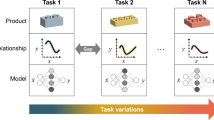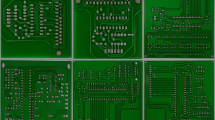Abstract
Zero-Defect Manufacturing (ZDM) is continuously emerging as the most critical target of the Industry 4.0 era. Minimization of the defected products in the industrial production chain can contribute towards significant improvements of the operational costs, the production efficiency and speed, as well as the environmental footprint. This work proposes a Machine Learning (ML) based scheme for intelligently and proactively allocating orders to printing machines, so as to ensure minimization of the defected products. Based on a historical dataset extracted by a printing company, ten supervised learning regression models were trained to estimate the machine-specific defect ratio of new orders, given their multi-feature requirements. To optimize the machine selection policy, several widely-used ML schemes were compared in terms of their performance on unseen data samples. Extensive simulations were carried out to stabilize the hyperparameters of the ML models, including single-model, ensemble and Deep Learning based regressors. Results showed that Multi-Layer Perceptron (MLP) outperform the rest of the benchmarking regressors in accurately predicting the defect rate of each machine, with the ensemble methods presenting also enhanced accuracy. Finally, the misclassification ratio of the proposed algorithm was assessed by quantifying the number of optimally allocated orders to printing machines, exhibiting that the majority of orders are correctly classified.
Access this chapter
Tax calculation will be finalised at checkout
Purchases are for personal use only
Similar content being viewed by others
References
Dalenogare, L.S., Benitez, G.B., Ayala, N.F., Frank, A.G.: The expected contribution of Industry 4.0 technologies for industrial performance. Int. J. Prod. Econ. 204, 383–394 (2018)
Psarommatis, F., Sousa, J., Mendonça, J.P., Kiritsis, D.: Zero-defect manufacturing the approach for higher manufacturing sustainability in the era of industry 4.0: a position paper. Int. J. Prod. Res. 60, 1–19 (2021)
Angelopoulos, A., et al.: Tackling faults in the industry 4.0 era—a survey of machine-learning solutions and key aspects. Sensors 20(1), 109 (2020)
Caiazzo, B., Di Nardo, M., Murino, T., Petrillo, A., Piccirillo, G., Santini, S.: Towards Zero Defect Manufacturing paradigm: a review of the state-of-the-art methods and open challenges. Comput. Ind. 134, 103548 (2022)
Trakadas, P., et al.: An artificial intelligence-based collaboration approach in industrial IoT manufacturing: key concepts, architectural extensions and potential applications. Sensors 20(19), 5480 (2020)
Kaloxylos, A., Gavras, A., Camps Mur, D., Ghoraishi, M., Hrasnica, H.: AI and ML—enablers for beyond 5G networks. Zenodo, Honolulu, HI, USA, Technical report (2020)
Amon-Tran, I., Anayath, R., Pai, A.S., Kamath, N., Shenoy, S., Harikrishnan, A.: An approach to minimize carbon footprint for an environmental friendly printing by optimizing an offset machine in a printing facility. Procedia Soc. Behav. Sci. 37, 514–527 (2012)
Villalba-Diez, J., Schmidt, D., Gevers, R., Ordieres-Meré, J., Buchwitz, M., Wellbrock, W.: Deep learning for industrial computer vision quality control in the printing industry 4.0. Sensors 19(18), 3987 (2019)
Angelopoulos, A., et al.: Impact of classifiers to drift detection method: a comparison. In: Iliadis, L., Macintyre, J., Jayne, C., Pimenidis, E. (eds.) EANN 2021. PINNS, vol. 3, pp. 399–410. Springer, Cham (2021). https://doi.org/10.1007/978-3-030-80568-5_33
Dengler, S., Lahriri, S., Trunzer, E., Vogel-Heuser, B.: Applied machine learning for a zero defect tolerance system in the automated assembly of pharmaceutical devices. Decis. Support Syst. 146, 113540 (2021)
Pedregosa, F., et al.: Scikit-learn: machine learning in Python. J. Mach. Learn. Res. 12, 2825–2830 (2011)
Acknowledgment
This work has been partially supported by the project Offspring, under the open call of EFPF project, funded by the European Commission under Grant Agreement number 825075 through the Horizon 2020 program.
Author information
Authors and Affiliations
Corresponding author
Editor information
Editors and Affiliations
Rights and permissions
Copyright information
© 2022 IFIP International Federation for Information Processing
About this paper
Cite this paper
Angelopoulos, A. et al. (2022). Allocating Orders to Printing Machines for Defect Minimization: A Comparative Machine Learning Approach. In: Maglogiannis, I., Iliadis, L., Macintyre, J., Cortez, P. (eds) Artificial Intelligence Applications and Innovations. AIAI 2022. IFIP Advances in Information and Communication Technology, vol 647. Springer, Cham. https://doi.org/10.1007/978-3-031-08337-2_7
Download citation
DOI: https://doi.org/10.1007/978-3-031-08337-2_7
Published:
Publisher Name: Springer, Cham
Print ISBN: 978-3-031-08336-5
Online ISBN: 978-3-031-08337-2
eBook Packages: Computer ScienceComputer Science (R0)






